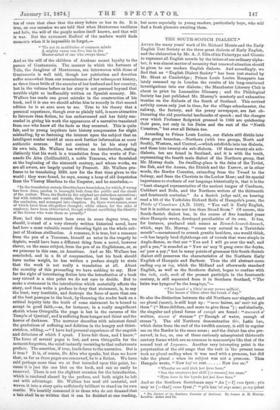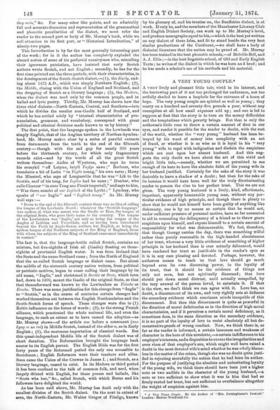THE SOUTH-SCOTCH DIALECT.*
• The Dialect of the Southern Counties of Scotland. By James A. H. Murray. London: Asher and Co. AFTER the many years' work of Dr. Richard Morris and the Early English Text Society at the three great dialects of Early English, and the elaboration by Mr. A. J. Ellis of his Palmotype and Glossie to represent all English sounds by the letters of our ordinary alpha- bet, it was almost matter of necessity that renewed attention should be given to our modern English dialects. And accordingly, we find that an "English Dialect Society" has been just started by Mr. Skeat at Cambridge ; Prince Louis Lucien Bonaparte has lately summed up in London the results of his long-continued investigations into our dialects ; the Manchester Literary Club is about to print its Lancashire Glossary ; and the Philological Society has just published Mr. Murray's masterly and exhaustive treatise on the dialects of the South of Scotland. This revived activity comes only just in time, for the village schoolmaster, the railway, the factory, and the penny newspaper, are fast ob- literating the old provincial landmarks of speech ; and the changes- over which Professor Sedgwick groaned in 1868 are quickening their pace, not only in his Dales and the rest of the "North Countree," but over all Britain too.
According to Prince Louis Lucien, our dialeta still divide into three great branches,--Northern (with two groups, North and South), Western, and Central,—which subdivide into ten dialects, and these into twenty-six sub-dialects. Of these twenty-six sub- dialects, ten are found in Scotland, and it is with the tenth, representing the fourth main dialect of the Northern group, that Mr. Murray deals. Its dwelling-place is the dales of the Teviot, the Esk, and the Annan, the Ettrick and the Yarrow, or in other words, the Border Counties, extending from the Tweed to the Solway, and from the Cheviots to the Locher Moss; and its special importance to students of our langnage historically is, that it is the "least changed representative of the ancient tongue of Caedmon, Cuthbert and Beda, and the Northern writers of the thirteenth and fourteenth centuries." As a Scotch judge said, on hearing read a bit of the Yorkshire Richard Rolle of Hampole's poem, the Pricke of Conscience (A.D. 1348), " You call it Early English, but it is neither more nor less than Broad Scots." Of course, this South-Scotch dialect has, in the course of five hundred years since Hampole wrote, developed peculiarities of its own. It has, for instance, produced such names as Reuwch-heuwch-hauwch, which, Bays Mr. Murray, " comes very natural to a Teviotdale mouth"—accustomed to crunch granite boulders, one would think, —it has largely bred diphthongs out of vowels that were simple in Anglo-Saxon, so that our "You and I will go over the wall, and pull a pea," is sounded as " Yuw an' mey '11 gang owre the deyke, an' puw a pey;" but in many points of grammar this South-Scotch dialect still preserves the characteristics of the Northern Early English of Hampole and Barbour. Thus the old abstract-none ending ung or ing, which the Midland and afterwards standard English, as well as the Southern dialect, began to confuse with the inde, ende, ande of the present participle in the fourteenth century, is still separated from it in Southern Scotland, " The bairn was hyngand be the hangings,"—
" I've hoard o' at our yowos milkin',
Tho lasses a' liltan afore the break o' day."
So also the distinction between the old Northern mar singular, and ma plural (more), is still kept up : "meae bairns, an' mair tui gie them " (" More children, and more to give them ") ; and similarly, the singular and plural forms of enough are found : "aneuwch waitter, aneuw o' steanes " (" Enough of water, enough of stones "). The old Northern demonstrative thin, Latin law, which dates from the end of the twelfth century, is still in regular use on the Border in the same sense ; and the dialect has also pre- served, in huz, us, one of those curiously misaspirated thirteenth century forms which are so common in manuscripts like that of the second text of Layamon. Another very interesting point is the perpetuation of the old usage that the verb in the present tense
took no plural ending when it was used with a pronoun, but did take the plural s when its subject was not a pronoun. Thus Hampole wrote, "Now haf we rest Now love we." " Wharfor we suld Pink Pat lyres here."
" Sen the creatures ',at skill [_-.= reason] has nave."
" Hym loves in the kynde Pat l'ai have tans." And so the Southern Scotchman says " Aa [=-I] cum fyrst ; yt's mey 'at [=that] cums fyrst ;" " yt's huz 'at says seae; ye sey quhat
•
they win," &c. For many other like points, and an admirably full and accurate discussion and representation of the grammatical and phonetic peculiarities of the dialect, we must refer the reader to the second part or body of Mr. Murray's book, while we call attention to its first part, or " Historical Introduction," of ninety-two pages.
This Introduction is by far the most generally interesting part of the work ; for in it the author has completely exploded the
absurd notion of some of his perfervid countrymen who, miscalling their ignorance patriotism, have insisted that early Scotch authors wrote Scotch, and not English ; secondly, he has for the first time pointed out the three periods, with their characteristics, in the development of the South-Scotch dialect,—(1), the Early, end- ing about 1475 A.D., which was simply Northern English ; (2), the Middle, closing with the Union of England and Scotland, and the dropping of Scotch as a literary language ; (3), the Modern,
when the dialect was used only by the common people, and in ballad and lyric poetry. Thirdly, Mr. Murray has shown how the three chief dialects—North-Eastern, Central, and Southern—into which he divides the smaller non-Gaelic half of Scotland, and which he has settled solely by " internal characteristics of pro- nunciation, grammar, and vocabulary, correspond with great political and ethnical divisions made known to us by history." The first point, that the language spoken in the Lowlands was simply English, that of the Anglian territory of Northan-hymbra- land, Mr. Murray makes clear by a series of parallel extracts from documents from the tenth to the end of the fifteenth
century— though with the sad gap for nearly 300 years before the thirteenth century, for which only fragmentary
records exist—and by the words of all the great Scotch writers themselves : Andro of Wyntoun, who says he turns his cronykil "off Latyne, intyll Ynglys sawe ;" Barbour, who translates a bit of Latin "in Ynglis toung," his own verse ; Harry the Minstrel, who says of Longueville that he was " Lik to the Scottie, sauf of his tong, for Inyliss had he nane ; " Dunbar, who calla Chaucer " in oure Tong ane Flouir imperial]," and says to him, Was there noucht of our ing!isch al the Lycht ; " Lyndsay, who speaks of "our Inglis" and "Inglisch lowly." As Mr. Murray well says :-
"Down to the end of the fifteenth century there was no idea of calling the tongue of the Lowlands Scotch : whenever the Scottish language' was spoken of, what was meant was the Gaelic or Erse, the tongue of the original Scots, who gave their name to the country. The tongue of the Lowlanders was 'Inglis,' not only as being the tongue of the Angles of Lothian and Tweoddale, and as having been introduced beyond the Forth by Anglo-Saxon settlers, but English, as being the spoken tongue of the Northern subjects of the King of England, those with whom the subjects of the King of Scotland came most immediately in contact."
The fact is, that the language-bottle called Scotch, contains no mixture, but five-eighths of Irish oil (Gaelic) floating on three- eighths of provincial English water. It was from Ireland that the Scots and the name Scotland came ; from the North of England that the so-called Scotch language or dialect came. But about the middle of the sixteenth century native writers, from political or patriotic motives, began to cease calling their language by its old name, "Inglis," and christened it Scottis or Scots, which term bad, down to 1400, meant the Gaelic of the original Scots, so that that thenceforward was known to the Lowlanders as Yrische or Ersche. There was some justification for this change from "Inglis" to " Scottis," as in the course of centuries certain changes had worked themselves out between the English Northumbrian and the South-Scotch forms of speech. These changes were due to (1) Keltic influences on the forms of words ; (2), to the strong French
alliance, which penetrated the whole national life, and even the language, to such an extent as to have caused the adoption—as Mr. Murray shows—of the article ane before a consonant (ane kyng = un roi) in Middle Scotch, instead of the older a, as in Early English ; (3), the enormous importation of classical words. But this quasi-independent Middle life of the Scotch dialect was of
short duration. The Reformation brought the language back nearer to its English parent. The English Bible was for the first forty years of the Reformed period the only one accessible to Scotchmen ; English Reformers were their teachers and allies. Soon came the Union of the Crowns in James I. ; and Scotch, as a literary language, ceased to exist. In its Modern or third period it has been confined to the talk of common folk, and used, when largely diluted with English, for those poems and ballads, like "Scots wha hae," &c., called Scotch, with which Burns and his followers have delighted the world.
As has been said above, Mr. Murray has dealt only with the smallest division of the Scotch dialect. On the next in extent of area, the North-Eastern, Mr. Walter Gregor of Pitsligo, known by his glossary of, and his treatise on, the Banffshire dialect, is at work. If only he, and the members of the Manchester Literary Club and English Dialect Society, can work up to Mr. Murray's level, and produce monographs equal to his,—which is the best yet written on any dialect of these Isles, and fit to stand beside the very best similar productions of the Continent,—we shall have a body of dialectal literature that the nation may be proud of. Mr. Murray has been trained in the best phonetic schools,--of Melville Bell, and A. J. Ellis ;—in the best linguistic school, of Old and Early English Texts ; he writes of the dialect in which he was born an d bred ; and he has made a scholar's use of his methods and his material.



































 Previous page
Previous page